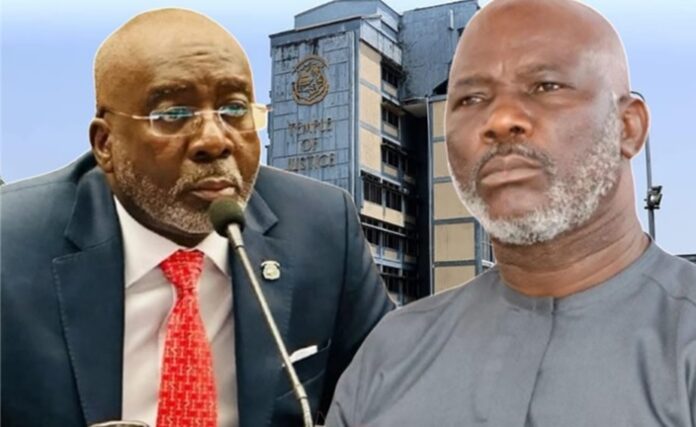MONROVIA – The Supreme Court of Liberia has reserved judgment in the contentious Bill of Information case filed by Speaker J. Fonati Koffa’s legal team, but legal experts suggest the proceedings signal a significant victory for the embattled Speaker. The court’s scrutiny of the Majority Bloc’s legitimacy has exposed the fragile constitutional footing upon which their case stands, raising critical questions about the legal basis of their actions.
Atty. Isaac W. Jackson Jr., in a statement following the March 26 hearing, described the difficulty faced by the Majority Bloc’s lawyers in convincing the Justices of their legal standing. He argued that the challenges did not stem from a lack of competence but rather from the absence of legal justification for their attempts to sideline Speaker Koffa. The Supreme Court’s emerging position, Jackson noted, suggests a likely ruling in Koffa’s favor, which could unravel a series of constitutional violations perpetrated under the guidance of Justice Minister Cllr. Oswald Tweh.
At the center of the controversy is the questionable role played by Senate Pro Tempore Nyonblee Karngar-Lawrence, who justified passing the 2024 National Budget based on what Jackson described as Tweh’s “twisted interpretation” of the Supreme Court’s previous ruling. Jackson did not mince words in his critique, branding Karngar-Lawrence’s reliance on executive legal advice as a failure of legislative independence and a display of incompetence that should disqualify her from leadership.
If the Court ultimately rules in Koffa’s favor, the implications could be devastating for the administration of President Joseph Boakai. Jackson outlined several critical constitutional breaches that would follow such a ruling: the 2025 State of the Nation Address (SONA) would be deemed unconstitutional, the national budget’s passage would be illegal, and the Finance Ministry’s decision to withhold salaries from certain lawmakers would be unlawful. These violations, he warned, could open the door to an impeachment case against Boakai’s administration, pushing the country into a deep constitutional crisis.
The Supreme Court had previously reprimanded the Majority Bloc for failing to adhere to constitutional provisions in their bid to remove Speaker Koffa. Justices, including Chief Justice Sie-A-Nyene Gyapay Yuoh and Associate Justice Yussif D. Kaba, expressed concern over the growing chaos within the legislature, citing instances of arson at the Capitol, disputes over parking spaces, and the deepening divide between lawmakers as symptoms of a governance breakdown.
Despite the Court’s insistence that legislative procedures must conform to Articles 33 and 49 of the 1986 Constitution, both factions of the House remain locked in parallel operations. Speaker Koffa continues to preside over the Minority Bloc, while Representative Richard Koon leads the self-proclaimed Majority Bloc. The ongoing standoff underscores the broader governance crisis facing Liberia, with Jackson warning that Boakai’s reliance on legally untested advisors and politically motivated decision-making could lead to his administration’s downfall.
“The wages of sin is death,” Jackson stated. “The sin of repeating past mistakes and relying on egregiously incompetent, simple-minded legal advisors shall bring about the death of the Boakai administration.” He vowed to invoke Article 62 of the Constitution in the wake of the Supreme Court’s final ruling, setting the stage for a prolonged legal and political battle that could reshape Liberia’s governance landscape.







